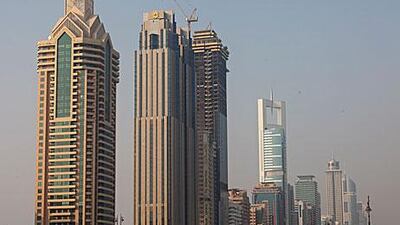Promoters of shared ownership schemes can see opportunity in the UAE's struggling property market.
"With whole ownership at its lowest ebb, the opportunity for shared ownership is now," Piers Brown, the founder of the web portal Fractional Life, told an industry gathering at the Yas Hotel this week.
Fractionals, timeshares, exchange clubs and their related products are a common - and controversial - staple in North America and Europe. But there has been little interest so far from the UAE.
Of the 104 properties offering fractional programmes in the MENA region, accounting for 5,985 units, only 11 per cent are in the UAE, according to research by NorthCourse Advisory Services.
This week's conference, Fractional Life's first in the UAE, was entitled "New Horizons … New Opportunities". The goal was to convince more local developers and consumers to embrace the concept.
But executives acknowledge it will be an uphill battle. Only about 50 people attended the conference, primarily representing companies already linked with such schemes.
"This conference has been the hardest" to produce, said Mr Brown, who recently presented similar conferences in the UK and Miami. "The region is in so much transition."
In many ways, the idea of shared ownership, or timeshares, is a foreign concept in the region, where buyers typically buy property as an investment. Fractional companies typically promote these programmes as a "lifestyle choice", rather than investments.
And fractionals have not been immune to the downturn in the market. After posting US$2.3 billion (Dh8.44bn) worth of transactions in North America in 2007, sales in the sector slumped to $860 million last year, according to data tracked by Ragatz Associates.
But the theory goes that fractionals begin to look more attractive in tough times, when people are reluctant to buy a whole unit.
Even the wealthy are "looking much more carefully at how they spend their money," said Mike Balfour, the chairman and co-founder of The Hideways Club, which bills itself as a combination international luxury property investment fund and members' club.
Customers typically pay $400,000 to join The Hideaways Club, plus a $20,000 annual fee to use the club's properties for four to six weeks. It boasts 200 members, but only a handful from the UAE, said Mr Balfour.
In the past, with sales booming, UAE developers displayed little interest in shared ownership. Fractional plans add complications to the process and typically require more aggressive sales and marketing, because of the need to attract a larger number of buyers.
But in bad times, many developers around the world eager to find new ways to sell units are experimenting with such schemes.
"In the last four or five years, the hospitality industry [in the UAE] saw little need for anything beyond core products," said Shafi Syed, a regional director for the timeshare exchange company RCI. "All that's changed."
The number of UAE properties in RCI's programme has doubled from three to six in the past two years, said Mr Syed.
But the downturn in the market may eventually work against shared ownership schemes. If prices go too low, consumers might prefer to own their own units.
In many cases, "low market entry prices diminishes the rationale" for fractionals, said Claude Attala, the NorthCourse managing director.

